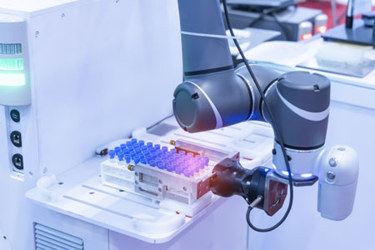Legend's CARVYKTI Offers Lessons In Commercial-Phase Changes
A conversation with Birk Vanderweeën, Legend Biotech

Commercial-stage bioprocessing, once greenlit by regulators, doesn’t adapt easily to change for obvious reasons. You don’t install new tires on a moving car.
Innovators want an easier way to introduce new technologies, especially automation, to established processes. Legend Biotech is trying to do that with an approach that matches automated process steps to manual ones as closely as possible. The standalone cell therapy company developed CARVYKTI (ciltacabtagene autoleucel), a one-time treatment for patients with relapsed or refractory multiple myeloma, in collaboration with Johnson & Johnson.
We had some questions for Legend about adopting new technology and continuous improvement for commercial products. Legend’s senior vice president of global manufacturing and supply, Birk Vanderweeën, agreed to help.
Innovation for commercial-phase products is notoriously difficult. Do you see opportunities to introduce new technology or processes with CARVYKTI? How do you earn stakeholder buy-in, including regulators and internal teams?
Since the successful commercial launch of CARVYKTI, we have implemented several new initiatives to enhance manufacturing efficiency and reduce out-of-specification rates, including enclosing the cell process, increasing automation, and refining existing process parameters.
In September 2024, we partnered with Multiply Labs to evaluate their robotic automation and precision cell processing technologies. This collaboration aims to enhance the efficiency of our CAR-T therapy manufacturing, reduce the time it takes to deliver treatments to patients, and improve scalability.
To gain stakeholder support — whether from regulators or internal teams — we engage them as early as possible. This approach helps us illustrate the benefits and establish a clear path to compliance and risk management. To achieve this, we conduct pilot studies or small-scale trials and develop risk-management plans that demonstrate the real-world impact of these innovations and support data-driven decision-making.
Cloud computing has been around for a while, but, historically, pharma is a late adopter. What types of cloud-based technology do you use to provide real-time data access, speed up analytics, and enhance remote monitoring and control in manufacturing?
Legend has increasingly adopted cloud-based solutions that have enhanced our operational efficiency, allowed faster decision-making, and improved compliance management. Like many advanced biopharma companies, we leverage a central data lake that feeds dashboards, analytics, and monitoring tools to support our manufacturing, quality control, and supply chain operations.
We partnered with Binocs in 2023 to help transition our Raritan, New Jersey, site from manual scheduling processes to a streamlined, scalable production planning system, improving our efficiency and scalability. The absence of a centralized system prevented teams from optimizing resource allocation and addressing conflicts in real time. As a result of the proof of concept we conducted, the phase eliminated 60% of manual steps and replaced most Excel schedules, meeting 87% of predefined user requirements out of the box. Since then, we have integrated Binocs with SAP and the manufacturing execution system and are working on expanding this system to additional nodes and sites based on best practices established at the Raritan site.
In addition to the Binocs platform, we use Veeva Vault QMS (quality management system), as it plays a crucial role in our efforts to manage the complexity and regulatory demands associated with CARVYKTI. By streamlining quality processes, enabling real-time collaboration, automating deviation and CAPA management, and ensuring robust audit trails, Veeva Vault QMS helps us maintain high product quality standards, patient safety, and regulatory compliance. This cloud-based solution is an essential tool for managing the life cycle of autologous therapies, ensuring that our manufacturing processes are efficient, scalable, and audit-ready at all stages.
While security and regulatory concerns remain top priorities, we have observed a significant improvement in our manufacturing performance and agility with the right blend of these cloud-based technology platforms. You recently spoke about the challenges that come with using bags and the limited technology available. Can you talk a little more about what those are and how Legend is addressing them?
Bags are used in cell and gene therapy manufacturing to handle critical materials such as cells, media, and reagents. These bags are typically single-use, especially during the scale-up process for autologous CAR-T therapy. However, the number of bags needed can reach hundreds or even thousands, which presents distinct challenges, including contamination risks, process variability, scalability, and cost. This approach also requires extensive manual labor and thorough quality checks.
Legend addresses these challenges by implementing continuous improvement processes for our manufacturing activities and quality. We are leveraging advanced technologies, such as our partnership with Multiply Labs, which provides automation capabilities to reduce human error, enhance precision, and create more scalable solutions for handling and processing bags and their contents. Additionally, we utilize closed-loop systems and integrate cloud-based platforms like Binocs to track, analyze, and optimize every step. This integration enables us to provide real-time data monitoring and insights into our process performance.
As the field of cell and gene therapy continues to evolve, we’ll likely see more innovations in manufacturing and logistics designed to overcome barriers to improve efficiency and patient outcomes.
About The Expert:
 Birk Vanderweeën joined Legend Biotech in August 2021 as vice president and general manager of Europe and was appointed senior vice president of global manufacturing and supply in November 2023. With over 25 years of experience in operations, quality, supply chain, and manufacturing, Vanderweeën has had an international career at several global biopharmaceutical companies. Prior to Legend Biotech, he served as the general manager of the Janssen Pharmaceutical Small Molecule API site. Before that, he was the SVP of regional quality for 12 biopharmaceutical manufacturing sites in Asia-Pacific and Israel and the vice president of manufacturing in Japan at Teva Pharmaceutical. For most of his career, he held several key leadership roles at AstraZeneca in Belgium, the U.K., and Japan. Vanderweeën received his master’s in pharmaceutical sciences from Ghent University, is a qualified industrial pharmacist, and holds a postgraduate in management from the University of Brussels.
Birk Vanderweeën joined Legend Biotech in August 2021 as vice president and general manager of Europe and was appointed senior vice president of global manufacturing and supply in November 2023. With over 25 years of experience in operations, quality, supply chain, and manufacturing, Vanderweeën has had an international career at several global biopharmaceutical companies. Prior to Legend Biotech, he served as the general manager of the Janssen Pharmaceutical Small Molecule API site. Before that, he was the SVP of regional quality for 12 biopharmaceutical manufacturing sites in Asia-Pacific and Israel and the vice president of manufacturing in Japan at Teva Pharmaceutical. For most of his career, he held several key leadership roles at AstraZeneca in Belgium, the U.K., and Japan. Vanderweeën received his master’s in pharmaceutical sciences from Ghent University, is a qualified industrial pharmacist, and holds a postgraduate in management from the University of Brussels.
